Program Class of 2020

20202 Macy Undergraduate Leadership Fellows Program Full Event
 Elizabeth Greubel
Elizabeth Greubel
Macy Undergraduate Leadership Fellows Program is a program for leadership development available to all students part of nursing, public health and health professions. It allows students to expand on their skills useful for their own personal and professional development, while providing us with a mentor involved with healthcare. The first time I have ever heard about the Macy Undergraduate Leadership Fellows Program (MULFP) was from my nursing advisor, Shannon Edwards, during a meeting where I was planning my future here at Drexel. Mr. Edwards brought up the MULFP believing that I would be interested based on previous conversations and what I planned to do during my time at Drexel. However, it wouldn’t be until a couple weeks after that my decision to be a part of the 2019-2020 cohort of students in the Macy Undergraduate Leadership Fellows Program was finalized.
This past summer, I had the opportunity to work in Dr. Rose Ann DiMaria-Ghalili’s lab studying the differences on how nutrition affects chronic wound healing in younger and older adults for the STAR Summer Showcase 2019. In my lab, I had the pleasure of becoming friends and working closely with Keyanna Brown, a previous Macy scholar. I asked her about her experience with the program which she praised telling me stories about her classes and classmates and how the program benefitted her personally. After hearing her point of view, I wanted to be a part of the next cohort.
The Macy Undergraduate Leadership Fellows Program has given me many fortunate opportunities and lessons that I believe I would not be able to experience in a typical college lecture. One of the aspects that attracted me was the minimal lecture-style allowing for group discussions, group activities, and more. I saw this as a rare opportunity to become more engaged in class rather than sitting in a 100-person lecture. This type of interactive classroom, I found to be one of my favorite parts of the class. In addition to this format, one of the parts I love most about Macy is the promise of a small cohort of students and the other Macy scholars currently. With the size of the class and open discussions, I have become friends with many of my classmates allowing us to connect on an intellectual level. Additionally, I have developed connections with different faculty in the College of Nursing and Health Professions and other healthcare professionals. One of my favorite times in the MULFP to date was the Mentor-Mentee Networking Event. It was exciting to be in room surrounded by so many different professionals in healthcare—it was incredible to hear their different stories. Conversations with the different mentors was a boost of confidence and motivated me to perform at my best during my time here at Drexel and as a future professional.
Macy Undergraduate Fellows Leadership Program has allowed me to gain a deeper understanding of current healthcare topics from many diverse perspectives. It has encouraged me to continue my personal and professional development and figure out what type of leader I will strive to be. MULFP is providing me the skills to develop into the nurse and healthcare leader I have always imagined being, and I will continue to carry the lessons I have learned using them in my future career but also my daily life.
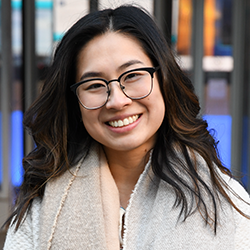 Tran Hua
Tran Hua
The thing that stood out the most to me about the Macy Undergraduate Leadership Fellows Program was the opportunity to work with a mentor. I thought it would be an incredible opportunity to have someone guide me during times of conflict as I’ve never had anyone serve that role during college. My mentor has given me advice and relayed her experience regarding how she became a leader.
Because I’ve always been so fearful of taking initiative, I thought this program would allow me to become a stronger and more confident version of myself through the dynamics of the courses offered. The program has allowed me to facilitate uncomfortable situations about topics that people often deem as sensitive, such as talking about one’s privilege, discussing the issues of one’s own biases related to certain races, and embracing vulnerability.
The long-term benefits I plan to derive from this program are owning my privilege and using it to challenge the status quo and to have integrity even if it costs me something. I plan to use leadership concepts to inspire others to believe in my vision/goal and collaborate to work towards reaching it.
My experience as a Macy fellow has been rewarding because I’ve learned about the dynamics of teams versus groups, managing versus leading, and branding myself in a professional setting. These concepts play an integral role in how I can be the best version of myself and how to collaborate with my team members to reach a shared goal and vision.
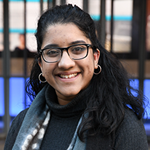 Nabelah Hussain
Nabelah Hussain
Becoming jaded as a college student has become par for the course, especially in the undergraduate career of an aspiring healthcare professional. Some might begin to lose sight of why they chose the path of healthcare in the first place and find that their light at the end of the tunnel is growing dim. But becoming a Macy fellow rekindled the dwindling light at the end of my tunnel.
While the Macy classes are certainly a break from hardcore STEM courses, it presents the arguably more trying task of having to rise to the challenges of being able to articulate your values and identity, and how that informs your influence and mark on the world. There have been conversations and exchanges that have brought fellow Macy fellows to tears because they were made to confront their realities and privilege in a way that they had never experienced before. I, myself, have been moved to the point of tears through the reckoning of my beliefs and the realization that I was not being honest with myself regarding a lot of “core values.” I came to the epiphany that a lot of my limits were self-imposed, that I had allowed myself to become docile.
I would be remiss if I didn’t mention my favorite part of the Macy program: the mentors! Having a professional mentor who is not a cold clinician and actually cares about structural competence and social determinants of health is truly a game-changer. Every conversation I have with my mentor is fruitful and she’s provided resources for learning, shadowing and networking that I would not have been able to access myself. I think having my mentor, as well as everyone that I have and will be able to meet through her, is the most tangible long-term benefit the Macy program has bestowed upon me.
The intangible long-term benefit of the Macy program comes not directly from the content but from learning conduct, establishing ground rules, listening, and challenging. The Macy program mobilizes the philosophy that social justice is not abstract wishful thinking, but measurable, actionable and achievable. Are there systems in place that are broken? Yes, but we are a part of those systems and therefore have a say in what change needs to take place. Once your eyes have been opened to the fact that you can’t be neutral on a moving train, and complacency is synonymous to being complicit, there’s no turning back.
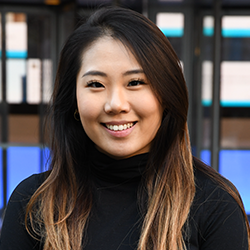 Insun Kim
Insun Kim
According to the book, Primal Leadership: Realizing the Power of Emotional Intelligence, leadership has six different approaches: visionary, coaching, affiliative, democratic, pacesetting and commanding (Harvard Business School Press, 2002). The leaders who achieve the best results practice more than one of these styles daily. Growing up, I never saw myself as a leader. I was fixated on a singular definition of a leader and I was not someone who fit with that definition. During my freshman nursing class, a representative came and spoke to my class about the Macy Undergraduate Leadership Fellows Program. At that time, I was adjusting to college so it did not occur to me how valuable and enriching this program could be until my senior year.
As a Macy’s program advocate, I highly encourage young adults to join this program. Throughout, I have met highly accredited and accomplished individuals including faculty, mentors and guest speakers who have challenged me and encouraged my growth. It helped me recognize leadership as a skill that can be learned, developed and refined.
Through this process, I was able to define and practice my own leadership style. I was able to increase my self-awareness not only through a self-reflection of my values and my goals, but also by taking leadership practices inventory and emotional intelligence assessments that evaluated my strengths and weaknesses with my answers. I realized that without knowing who I am as a person, I cannot be a good leader. Another element of the program is it allows us to discuss topics that are controversial in a safe space and gives us the opportunities to express and voice our thoughts on these important matters. We come to recognize and understand how health equity and health disparities should matter to a healthcare professional through open, panel discussions and roundtable debates rather than through lectures. It broadens our scope of thinking by working alongside students who are like-minded, yet vastly different in what they do and learn in their respective fields.
In healthcare, I will come across diverse populations with whom I may have difficulty connecting, but as nurses, we are expected to enter this industry with cultural competence and an open-mindedness. But those two components are only basic necessities to carry on with our job. With my participation in the Macy Undergraduate Leadership Fellows program, I was able to attain the interpersonal skills to work effectively in multidisciplinary teams, and the knowledge to facilitate challenging conversations with those that I may not share similar experiences or backgrounds in. This program has been one of the best attributes of my college experience at Drexel and a great steppingstone into the preparation of my career making.
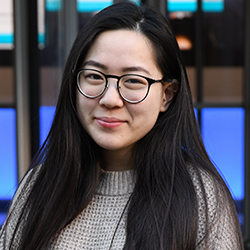 Amber Liu
Amber Liu
Journey of self-growth
Think of a course that can focus on personal growth, professionalism, and leadership through a diverse and engaging curriculum. Well, that course is the Macy’s program. In nursing or in any field, self-accountability and professionalism are to be an effective leader. Macy has offered a specific course load aimed to gain exposure and tools that aid in interpersonal relationships, my own goal management, a network with and self-reflection.
Open to Diversity
This program is unique. It targets aspects of leadership by incorporating different learning styles, various speakers, through provoking discussions and teamwork exercises. Unlike many of my nursing core curriculum classes I have been able to participate in invigorating discussions to better understand the structural framework behind the healthcare industry
One of the most important aspects of this program is the focus on supportive relationships and self-confidence.
This program also pushes individuals beyond what some might call it their “comfort zone.” For example, Dr. Ebony White discussed implicit bias and that we must realize and acknowledge how our identity is perceived by others. The class discussions delved into something not normally spoken about but is important. No matter how comfortable or uncomfortable a topic may be, without discussion, how can individuals become aware?
Effort is not Wasted
Without this program I would not have met my mentor, Abbey Roepke. We have developed a relationship in which we could discuss not only topics about the healthcare industry but about our life experiences and future plans. This program doesn’t just offer these experiences without individual participation and engagement. You gain as much as you put in. I have developed characteristics—effective listening, critical thinking, expressing concerns, and spreading inclusivity —that will aid in my pursuit of becoming a leader. Diversity, in my eyes, is extremely important because the world is teeming with different viewpoints that need to be heard and considered. This program holds a healthy space for expressing opinions and thoughts. Everyone has their own interpretation of what leadership is and through this program, thus far, I have been able to build upon my strengths and confidence.
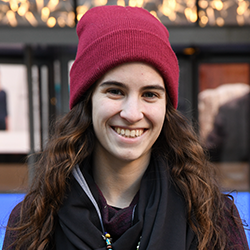 Alexandra Lodise
Alexandra Lodise
I remember sitting in my Health Assessment lecture class during summer term of my sophomore year when Dr. Roberta Waite came in to speak to our class as the Macy Undergraduate Leadership Fellows Program. I was intrigued by the Macy values including mutual respect, social learning, social responsibility, democracy and growth and change. And as someone who had participated in other organization and workshops that highlight personal growth work, I was extremely excited to have an opportunity to deepen my understanding of myself as an undergraduate student.
I believe one of the greatest strengths of the Macy Undergraduate Leadership Fellow Program is the amount of social and community learning. By social and community learning I mean we are encouraged to conserve with our peers and professors about topics such as privilege and power, leadership and teamwork, and our healthcare system. We are able to speak about these social topics; in a community we have established. Which leads me into another strength of the Macy program. Working with ground rules and through agreements are things I value in all the communities in which I belong and was extremely glad to have that as a part of the Macy program. I believe this brings a level of trust and integrity into the community and we are able to understand more about ourselves through the process. I continue to bring that into my daily life whether I am a student, peer or facilitator of a community. The Macy program helped me understand the value of how I frame spaces and continue to ask myself how to do this in leadership roles.
This program’s courses differ from the average college undergraduate courses. For example, in biology or chemistry courses, professors may not even know my name, but in the Macy program, we each are given the opportunity to check in about how we are feeling, reflect on a leadership experience and address something we look forward to. Many of our class discussion center on given topics, framework from the professor, facilitator or video, and space for us to share our thoughts in an organized way. Instead of being given the answer or the right way, common in science-based courses, we are encouraged to find our answers and our ways of confronting topics in our society and field of healthcare. While I do understand that there is great benefit to learning how to take someone’s blood pressure or solve a mathematical equation, I also value different perspectives and honor personal decisions that I feel are lacking in our education sometimes. The Macy program works to balance my education, allowing the learning to be in internalized questions rather than only externalized principles.
I will always remember the Macy Undergraduate Leadership Fellows Program, connecting with my classmates engaging in weighty discussions, challenging beliefs, and honoring the moments when I was triggered and how I chose to handle them. The greatest benefit I will take away from Macy is the act of questioning systems, communities, policies and relationships and allowing myself to notice when something in those systems doesn’t feel right.
In conclusion, the Macy Undergraduate Leadership Program has been an experience I am grateful for having. I believe every student should have to take these courses to be introduced to topics that are so prevalent in our education system yet barely discussed as transparently as they are in these courses. I am glad to take part in a program where I can develop an understanding of who I want to be and the capacity to make the choices that allow me to step into that more fully.
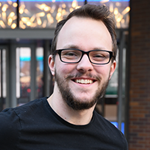 Daniel McGarry
Daniel McGarry
The Macy Undergraduate Leadership Program is a program built to assist students in gaining leadership development skills through mutual respect, emotional intelligence, social learning, open communication, social responsibility, democracy and growth and change (Drexel). This program has provided me the tools to better myself, not only as a leader, but a human being. I have grown with the help of my faculty, peers and mentor to become a more well-rounded individual capable of improved creative thinking, social issue awareness, open-mindedness on diverse perspectives and so much more through this three-term program.
The biggest strengths of the Macy Program, in my opinion, are the mentor pairing, the diversity of the faculty and classroom and the intertwining of leadership with social justice, ethics and teamwork. The mentor pairing has been essential to my growth. My mentor, Jenny Brice, and I have discussed what it means to be a leader, relationship and conflict management, and have personally worked on my goals I set for myself.
The diversity in the faculty and classroom has also been vital to my development. My professors, faculty mentor, guest speakers and peers have all given tremendous insight on how to be a leader no matter the background. As we address topics of social justice, ethics and values, diverse opinions drive the discussion and allows everyone to gain a new sense of understanding on each topic. Learning teamwork skills and how to be an effective team player has shown that trust and confidence in others and the ability to bring others together is required.
The Macy experience differs from the regular college experience because it is based on discussion and personal growth rather than lectures and grades. In my other college classes, I feel pride when I do well in class, but it is nothing compared to the sense of achievement I feel when I can sense a noticeable growth in my personal being.
Some of the long-term benefits I expect to derive are problem solving and creative thinking skills, openness to multiple viewpoints and perspectives and the ability to share more of a vulnerable side with others through transparent communication.
Through the Macy Program, I have developed into a more caring and trusting person who is more aware of the different social issues everyone faces through their daily lives. I have learned how to become a better team member, how to facilitate and take part in difficult discussions, and I believe I have become a better leader. None of this would have been true without the Macy Undergraduate Leadership Fellowship Program.
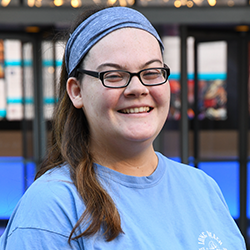 Ryan Mouraview
Ryan Mouraview
Before I heard about the Macy Undergraduate Leadership Fellows program, I already knew that I needed to work on my leadership skills. Nursing is my passion, but I want to be a leader within a team of healthcare workers in the future so that I am able to advocate for each and every patient.
In addition to helping cultivate these skills, the Macy program has many benefits, including being in a safe space to express ideas, feelings and thoughts. My peers and I have grown tremendously close in this space throughout the year and have been able to debate on topics that are near and dear to our hearts.
Another benefit of the Macy program is being paired with a personal mentor. My mentor has taught me many professional and personal leadership skills that I will have for the rest of my career. The mentors in the Macy program are there to support you, so you know that you are not alone in this journey and have someone to look up to who has accomplished amazing career peaks within healthcare.
I can honestly say that being a part of Macy has been extremely valuable for me. I have learned so much about myself, how I work with others and how I am affected by others. I know that I will carry these experiences into my future career in healthcare, and I now have a better understanding of what it means to be a leader.
 Marlee Muha
Marlee Muha
Macy Undergraduate Leadership Fellows Program has helped me to cultivate both relationships with people I would never have met and my own leadership skills and practices. With the help of the Macys staff, professors, and guest speakers, I have been able to become a better leader and even learn more about myself in the process.
I learned about the Macy program during one of my first health services administration classes. I had just changed my major from biology to HSAD, and I was still unsure if I would understand what it meant to be a healthcare administrator. The idea of a set of classes focusing on leadership while simultaneously introducing issues prevalent in the healthcare field was very appealing to me. A program that pairs each student with a mentor to help guide them was also attractive.
I have become friends with every member of the class. We all have varying majors, and everyone has different ideas, values and morals, but that made it interesting and enlightening to hear what they have to say about the topics brought up in class. The discussions that we have are often based on sensitive topics, which can make people feel strong emotions. Still, everything was calmly discussed in a respectful manner because the class comes up with ground rules to follow throughout the term. The openness of the class along with the fact that you are with the same people for three terms allows for bonding with other Macy fellows.
The Macy Undergraduate Leadership Fellows Program taught me how to be a better leader, that there are more parts to leadership than I previously knew about, and that there is not just one style of leadership. Hearing the ideas and thoughts of other students studying to become healthcare providers has made me see things in new ways and it helped me feel more secure and comfortable with the decision to change my major.
 Kruti Patel
Kruti Patel
I was rigorously reviewing notes for an exam in one of my classes, when my head shot up as one of the representatives of the Macy’s Undergraduate Leadership Fellows Program began to speak. She talked about the many different types of leaders there are today and how we can make an impact by emerging as one on our own. This program is designed to help you reflect on your skills and capabilities as well as utilize that information to improve and influence those around you. The more knowledge I gained about this program, the more eager I was to join.
Throughout my years at Drexel, I have known about this program but never really considered it until recently. I always pushed off the application and decided to wait until I was really ready to delve deeper into myself. I’ve always thought of myself as a leader—I am part of many organizations and am a mentor in many of them. However, I never took the time to contemplate: How am I a leader? I haven’t always been involved in school activities – especially in high school. As I entered college, I decided to participate in different organizations to see where my path took me hoping to learn more about my own interests.
Many of my friends and classmates joined this program and shared a lot of information and personal experiences. They said it helped shape them into a better person and make many connections through their mentors and classmates. The mentors really help guide students in their education and careers – I know mine has done an excellent job! This incredible program has not failed to surprise me every week with its unique content. This program helped me gain an understanding of my own beliefs and express my thoughts to the rest of my cohortas well as how I wanted to present myself as a leader to those around me.
Moreover, the diverse selection of topics we and discussions we have with our peers has helped me gain a different perspective on privilege, oppression, gentrification and more. I absolutely love the dialogue between my peers and I as we keep diving deeper into these conversations. My favorite part of this program is being able to listen to our influential guest speakers who talk about their experiences going through school and what it took to get where they are in their careers currently. It’s amazing to see how much potential and opportunity we all have waiting for us after we graduate—it’s up to us to decide whether or not we grab it.
The way the course is structured is different than the typical lecture-based classes many students are used to. As a nursing student, I have seen the way my core nursing classes with intense studying and our performance on exams determining our grades. MULFP integrates cultural and social aspects to our discussion-based learning versus lecture style.
I will be able to reflect back on this experience and remember all the wonderful encounters I had with our faculty, staff, mentors and peers. Through my career, the skills I have learned in this program will be essential in working as a team with coworkers. As a Macy’s fellow, you will be given the opportunity to figure out what it takes to become a leader and how many different leadership styles there are. I will continue to embrace the many lessons I have learned y and am excited to share the wisdom I have gained with the people I will encounter in years to come.
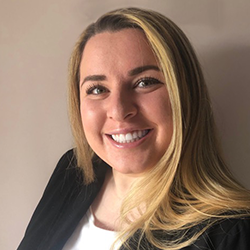 Katie Perera
Katie Perera
Whoosh! The sound of a new email notification pops up onto my iPhone lock screen. Afraid of missing any important work or class update, I immediately swipe it open. With a quick scan, it’s about the Macy Undergraduate Leadership Fellow Program. My good friend had already been accepted into this prestigious program and was encouraging me to apply. My friend stressed the program’s lessons on diversity, inclusion, social justice and privilege, something none of my other classes talked about. Shortly after applying, I interviewed with Dr. Waite and was subsequently accepted into the program.
Phi Nguyen, the assistant dean of Student Affairs, is one of the guest speakers who’s presented to our class helping us reflect on the things that are most important to us. Meg Leahy, a certified counselor, guided us through a self-reflection journal where we recorded letters to our fears and our dreams. Ebony White, PhD, an assistant clinical professor in Counseling and Family Therapy, focused her class on oppression, microagression and privilege. Throughout the course, we talked about Kouzes and Posner’s theory of modeling—inspiring a shared vision, challenging the process, enabling others to act and encouraging the heart. From being associated with this program, I have gained a professional mentor, peers I hope to one day call my colleagues, and much insight about myself.
Not knowing everyone in the class, we began this journey with a community check-in: share emotions we were feeling, a leadership experience we had had in the past week and what we were excited for in the upcoming class. We continued these community check-ins each week, which allowed us to get to know each other better and to slow down and take 15 minutes to hear from all of my peers. I feel strongly connected to the faculty, my fellow scholars and those with whom I have come into contact during the program because it truly does feel like a safe space.
I already see myself thinking with a more open mind. Growing up, I always felt like I lived in a bubble because of the lack of culture and diversity in my town. Now, being surrounded by my peers with such distinct backgrounds, I am confident that I no longer have tunnel vision. Long-term, I envision that I will be able to set SMART goals for myself and be able to consistently self-reflect. The Macy Program will also have given me the skills to communicate with interdisciplinary team members, propose an elevator speech for future employers, and yearn for a higher knowledge.
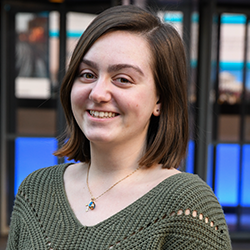 Domenica Pusic
Domenica Pusic
I first learned about the Macy Undergraduate Leadership Fellows Program through an online presentation by Dr. Waite during the Introduction to Addictive Disorders course in spring term 2019. I remember viewing the four pillars of the Macy Leadership Model, wondering if I had the capability to learn and grow alongside these standards. What attracted me most to the program was the ability to network with others who also aspire to work within the health field; as a Behavioral Health Counseling major, I knew that it would be beneficial to work with students who had other perspectives of healthcare, and that including mental health into conversations would be just as important.
The greatest strength that the Macy program has helped me gain is the establishment of leadership goals that will ultimately affect me today and in the future. These goals are a product of the courage needed to have difficult conversations with our Macy class, as well as the ability to be vulnerable to do so. From these experiences, I have learned about myself: I have come to terms with what I know, what I want to learn, what my limitations are and what I fear. Yet over time with the Macy program, I have also learned how I can grow; I understand how to learn from my mistakes and challenge myself, how to learn from others, how to expand on my strengths, and how to inspire and encourage others.
Before the Macy Program, I thought leadership was just the act of doing. Now, I realize that leadership is not what you can do for yourself, but what kind of impact it leaves on others, so that those people can continue to make positive change.
Overall, the Macy Undergraduate Leadership Fellows program has helped me find potential that I never saw before. With the help of the Macy faculty, mentors and the Macy class of 2020, I can see a brighter future of health care.
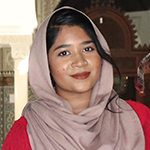 Samiha Tahsin
Samiha Tahsin
I kept switching majors during my first year at Dexel. In the winter term of my sophomore year, I finally settled on public health. I came across the Macy Undergraduate Leadership Fellows Page (MULFP) page while going through the Drexel University Dornsife School of Public Health website. Immediately, I saw an amazing opportunity to experience something I thought working in the public health workforce. It was an interdisciplinary environment of individuals from various backgrounds and majors all working towards improving the health of individuals and/or their community. Because I would be applying for co-op the following year, so taking advantage of this program will help me apart from other students within my field.
The program allows students to reflect and recognize both their strengths and weaknesses, how to best utilize those talents and how to overcome their flaws. At the start, we created an Individual Professional Development Plan where we recorded our goals and the steps necessary to take to achieve it. The plan challenges students to move outside of their comfort box to become not only a better student and individual, but also as a leader.
The experience I’ve had as a Macy fellow significantly differs from what I’ve already experienced at Drexel. I’ve had professors teach classes solely based on PowerPoints, others prefer readings and discussion-based classrooms while some have used a combination of all three. Macy invites guest lecturers who help us gain a better understanding of ourselves as individuals, promote collaboration and the development of cultural awareness skills and facilitatediscussions regarding social justice principles and so much more. At the beginning of every class, everyone shares something about themselves. There was a period where I was stressed over co-op and family concerns. The safe and supportive environment created within the 15-person classroom allowed me to openly and comfortably share personal problems with all of my peers with whom I created meaningful and close relationships.
Another relationship that has been equally important to me it the one with my mentor. Quite often I’ve heard professors and leaders credit their success to mentors and emphasize the importance of a mentor relationship. However, in my case, I never knew where to look. Macy connected me with a mentor who was the best fit for me. We connected over our backgrounds and shared similar experiences. While she was able to put herself in my shoes, she was also able to provide invaluable insight for me as a student.
I believe Macy will help me as a student and in my future professional life. Being in public health requires working in teams of individuals of different backgrounds and this experience has been a head start for the real world.
 Hannah Thurner
Hannah Thurner
The Macy Program has been helping me learn about my own personal leadership style and how to improve it.
I switched my major from public health to health services administration because I am better at leadership and policy work than statistics. During my first health services administration class, the professor dedicated part of a classes to the Macy Undergraduate Leadership Fellows Program. I decided to apply for it. I thought it would be a good idea since someday I hope to be a leader in the healthcare industry. After I applied, I went for the interview and was accepted into the program and was excited to start the coursework associated with the program.
I have learned more about my leadership style and how I want to lead in the future by participating in the Macy program. It has helped me feel more confident in how I want to lead and taught me that I am more of a democratic leader using input of others when making decisions for the larger group of people. It makes people feel like their thoughts matter and that they’ve contributed. This program has also given me the opportunity to become familiar with other health professions. During our community check-ins, nursing students always talk about their shifts and use different terms I would not have learned until I worked in a hospital.
The other students in the program are so excited about what they do on co-ops and when talking about their experiences, it makes me more excited for when I go on my co-op.
The Macy Undergraduate Leadership Fellows Program has taught me that I want to be a compassionate leader in the healthcare industry where that and understanding are needed the most. The industry needs reform so that more people are able to get healthcare, and when people seek care, they feel comfortable.
The Macy Undergraduate Leadership Fellows Program has helped me cultivate my leadership style. It has helped me to know students in other health professions majors, understand what they go through and how my peers are feeling from week to week through the check ins. The Macy Undergraduate Leadership Fellows Program has been a great way to learn more about my leadership style and how I want to perfect it in the future.
 Fiona Xu
Fiona Xu
Growing up in a relatively close-knit, first-generation Asian community, I have been sheltered from the rich diversities that exist within this country and internationally beyond. However, what my hometown did offer me was the inheritance of a strong work ethic, ambition and the revelation of my passion to help others. With these characteristics, I was prepared to venture out of my comfort zone and explore the unfamiliar to discover further myself and experience collaborating with individuals from different backgrounds. Fortunately, I found the Macy program, and this became the perfect medium to enhance confidence in my interpersonal skills with diverse colleagues, expand my professional knowledge of the medical society, and to become more involved within my campus and community. The initiative step is always the hardest to take, but the Macy program was the supportive push that encouraged me to move forward.
The Macy Undergraduate Leadership Fellows Program (MULFP) is a unique elective unlike any other within the College of Nursing and Health Professions. The Macy program is also an excellent juxtaposition of the unique teaching styles at Drexel University. As a nursing major, most of my classes consist of lecture style teachings where one professor instructs over 200 students. However, in the Macy program, there is one professor for about 20 students. The advantage of smaller class size allows us to proactively engage with our peers and the professor in a safe space and converse in open discussion of under-covered topics such as microaggression, privilege, wicked problems, health administration and self-awareness.
This program motivated me to become more involved on campus and take on leadership roles in my fraternity, clubs and intramural sports. With further engagements, I was able to reach out to local organizations and coordinate volunteer opportunities for my fraternity and extracurricular clubs, which I never imagined doing. I can definitely say that I now have a better understanding of the United States health system in comparison to other countries around the world. I will apply these skills and knowledge to provide the best care and advocacy for my patients as a future health professional.